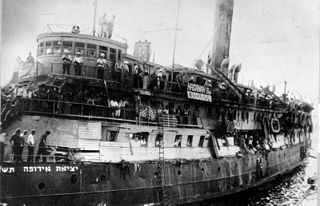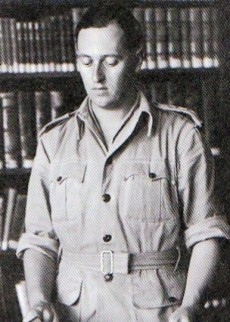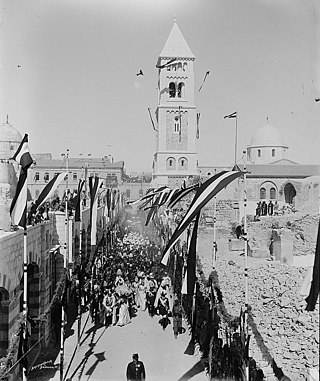
Zionism is an ethnocultural nationalist movement that emerged in Europe in the late 19th century and aimed for the establishment of a Jewish state through the colonization of a land outside Europe. With the rejection of alternative proposals for a Jewish state, it focused on the establishment of a homeland for the Jewish people in Palestine, a region corresponding to the Land of Israel in Judaism, and of central importance in Jewish history. Zionists wanted to create a Jewish state in Palestine with as much land, as many Jews, and as few Palestinian Arabs as possible. Following the establishment of the State of Israel in 1948, Zionism became Israel's national or state ideology.

Max Simon Nordau was a Zionist leader, physician, author, and social critic.

A homeland for the Jewish people is an idea rooted in Jewish history, religion, and culture. The Jewish aspiration to return to Zion, generally associated with divine redemption, has suffused Jewish religious thought since the destruction of the First Temple and the Babylonian exile.

The flag of the State of Israel was adopted on 28 October 1948, five months after the Israeli Declaration of Independence. It consists of a white background with a blue Star of David in the centre and two horizontal blue stripes at the top and bottom, recalling the design of the tallit (טַלִּית). The Israeli flag legislation states that the official measurements are 160 × 220 cm. Therefore, the official proportions are 8:11. Variants can be found at a wide range of proportions, with 2:3 being common.

The World Zionist Organization, or WZO, is a non-governmental organization that promotes Zionism. It was founded as the Zionist Organization at the initiative of Theodor Herzl at the First Zionist Congress, which took place in August 1897 in Basel, Switzerland. The goals of the Zionist movement were set out in the Basel Program.

Mount Herzl, also Har ha-Zikaron, is the site of Israel's national cemetery and other memorial and educational facilities, found on the west side of Jerusalem beside the Jerusalem Forest.

The Uganda Scheme was a proposal by British Colonial Secretary Joseph Chamberlain to create a Jewish homeland in a portion of British East Africa. It was presented at the Sixth World Zionist Congress in Basel in 1903 by Theodor Herzl, the founder of the modern Zionist movement. He presented it as a temporary refuge for Jews to escape rising antisemitism in Europe. The proposal faced opposition from both the Zionist movement and the British Colony.

The Zionist Congress was established in 1897 by Theodor Herzl as the supreme organ of the Zionist Organization (ZO) and its legislative authority. In 1960 the names were changed to World Zionist Congress and World Zionist Organization (WZO), respectively. The World Zionist Organization elects the officers and decides on the policies of the WZO and the Jewish Agency, including "determining the allocation of funds." The first Zionist Congress was held in Basel, Switzerland in 1897. Any Jew over age 18 who belongs to a Zionist association is eligible to vote, and the number of elected delegates to the Congress is 500. 38% of the delegates are allocated to Israel, 29% to the United States of America, and 33% to the remainder of the countries of the Diaspora. In addition there are about 100 delegates which are appointed by International Organizations affiliated with WZO.

Cultural Zionism is a strain of Zionism that focused on creating a center in historic Palestine with its own secular Jewish culture and national history, including language and historical roots, rather than other Zionist ideas such as Political Zionism. The founder of Cultural Zionism is Asher Ginsberg, better known as Ahad Ha'am. With his secular vision of a Jewish "spiritual center" in Eretz Israel/Palestine, he confronted Theodor Herzl. Unlike Herzl, the founder of political Zionism, Ha'am strove for "a Jewish state and not merely a state of Jews".
The American Zion Commonwealth was a Zionist settlement corporation that played an important part in the Jewish settlement of Palestine before the establishment of the State of Israel.

The Jewish Territorial Organisation, known as the ITO, was a Jewish political movement which first arose in 1903 in response to the British Uganda Scheme, but only institutionalized in 1905. Its main goal was to find an alternative territory to that of Palestine, which was preferred by the Zionist movement, for the creation of a Jewish homeland. The organization embraced what became known as Jewish Territorialism also known as Jewish Statism. The ITO was dissolved in 1925.

Theodor Herzl was an Austro-Hungarian Jewish journalist, lawyer, writer, playwright and political activist who was the father of modern political Zionism. Herzl formed the Zionist Organization and promoted Jewish immigration to Palestine in an effort to form a Jewish state. Due to his Zionist work, he is known in Hebrew as Chozeh HaMedinah, lit. 'Visionary of the State'. He is specifically mentioned in the Israeli Declaration of Independence and is officially referred to as "the spiritual father of the Jewish State".

The First Zionist Congress was the inaugural congress of the Zionist Organization (ZO) held in the Stadtcasino Basel in the city of Basel on August 29–31, 1897. Two hundred and eight delegates and 26 press correspondents attended the event. It was convened and chaired by Theodor Herzl, the founder of the modern Zionism movement. The Congress formulated a Zionist platform, known as the Basel program, and founded the Zionist Organization.
The Herzl Award is awarded annually by the Department for Zionist Activities of the World Zionist Organization (WZO) to outstanding young men and women in recognition of their exceptional efforts on behalf of Israel and the Zionist cause. The award was first awarded in 1954 to Winston Churchill, on the centennial anniversary of Theodore Herzl's death.
As an organized nationalist movement, Zionism is generally considered to have been founded by Theodor Herzl in 1897. However, the history of Zionism began earlier and is intertwined with Jewish history and Judaism. The organizations of Hovevei Zion, held as the forerunners of modern Zionist ideals, were responsible for the creation of 20 Jewish towns in Palestine between 1870 and 1897.

The Herzl Museum is a museum in Jerusalem, which deals with activities and vision of Theodor Herzl. The museum is located at the main entrance plaza to Mount Herzl.

Stephen Norman, born Stephan Theodor Neumann was an Austrian Captain in the British Army during World War II, Zionist activist, and the grandson of the founder of Zionism, Theodor Herzl.

Yaakov Hagoel, is the Chairman of the Executive of the World Zionist Organization. He was formerly acting chairman of The Jewish Agency for Israel.

Wilhelm II's voyage to the Levant in 1898 was a state visit that the German Emperor undertook in the Ottoman Empire between 25 October and 12 November 1898.
Zionist antisemitism or antisemitic Zionism refers to a phenomenon in which antisemites express support for Zionism and the State of Israel. In some cases, this support may be promoted for explicitly antisemitic reasons. Historically, this type of antisemitism has been most notable among Christian Zionists, who may perpetrate religious antisemitism while being outspoken in their support for Jewish sovereignty in Israel due to their interpretation of Christian eschatology. Similarly, people who identify with the political far-right, particularly in Europe and the United States, may support the Zionist movement because they seek to expel Jews from their country and see Zionism as the least complicated method of achieving this goal and satisfying their racial antisemitism.















